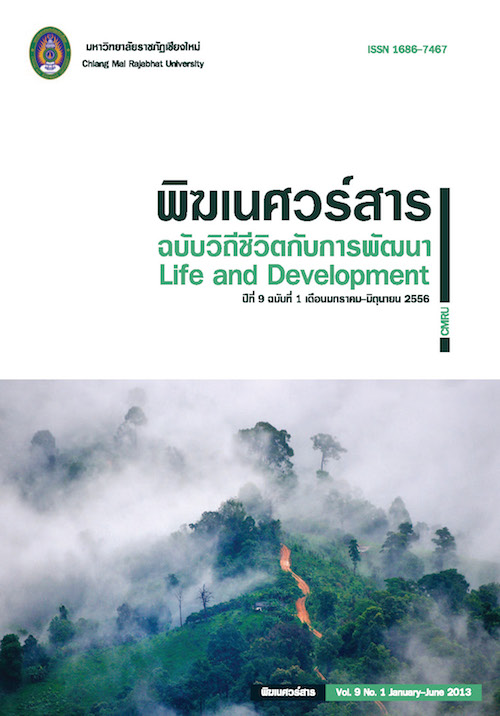การใช้กระบวนวิชาจิตตปัญญาศึกษา (CONTEMPLATIVE STUDIES) หมวดวิชาศึกษาทั่วไปพัฒนาคุณธรรม จริยธรรม และค่านิยม อันพึงประสงค์แก่นักศึกษาระดับปริญญาตรี มหาวิทยาลัยราชภัฏเชียงใหม่
Main Article Content
Abstract
ดำเนินการเก็บข้อมูลโดยให้นักศึกษากลุ่มตัวอย่างตอบแบบสอบถามเพื่อประเมินคุณธรรมจริยธรรม และค่านิยมอันพึงประสงค์ในชั่วโมงแรกของการเรียนวิชาจิตตปัญญาศึกษา จากนั้นจึงดำเนินการจัดกิจกรรมการเรียนการสอนรายวิชาจิตตปัญญาศึกษา ตามรายละเอียดของวิชาจิตตปัญญาศึกษา (มคอ.3) ให้กับนักศึกษากลุ่มตัวอย่างเป็นเวลา 1 ภาคการศึกษา แล้วทำกิจกรรม AAR : After Action Review ในชั่วโมงสุดท้ายของการเรียน จากนั้นจึงให้นักศึกษากลุ่มตัวอย่างตอบแบบสอบถามเพื่อประเมินคุณธรรม จริยธรรม และค่านิยมอันพึงประสงค์อีกครั้ง เมื่อถึงช่วงเวลาสอบปลายภาคการศึกษา นักศึกษากลุ่มตัวอย่างทำแบบทดสอบวัดผลสัมฤทธิ์ทางการเรียนวิชาจิตตปัญญาศึกษา และประเมินการจัดกิจกรรมการเรียนการสอนรายวิชาจิตตปัญญาศึกษาในเว็บไซต์ของมหาวิทยาลัย ตามลำดับ ผู้วิจัยได้นำข้อมูลทั้งหมดมาวิเคราะห์เพื่อตอบวัตถุประสงค์ของงานวิจัย โดยใช้สถิติพื้นฐานร้อยละ (%) ค่าเฉลี่ย ส่วนเบี่ยงเบนมาตรฐาน (S.D.) สถิติทดสอบ t-test และการวิเคราะห์เนื้อหา (Content Analysis)
This research aims to study the results of Contemplative Study learning management to develop virtue, morality and needed characteristics for Bachelor’s Degree students of Chiang Mai Rajabhat University according to the 6 indicators of The Office for National Education Standards and Quality Assessment (Public Organization). The second objective is to study the learning achievement on Contemplative Study course and the satisfaction of the sample group towards the contemplative study teaching and learning process. The sample groups are the 249 Bachelor’s Degree students who enrolled the GHUM 1101 course (Contemplative Studies) during the 2011 first semester. The research tools are the Contemplative Studies course description (TQF.3), the questionnaire to evaluate virtue, morality and needed characteristics for Bachelor’s Degree Students, the Contemplative Studies achievement test, the After Action Review activities, and the lectures’ evaluation through the website of the Academic Support and Registration Office of Chiang Mai Rajabhat University.
The data collection was done as the followings: evaluate the virtue, morality and needed characteristics of the sample groups at the first period, then use the contemplative study teaching and learning process for the Contemplative Study course according to the Contemplative Study course description (TQF.3) through the first semester. The After Action Review activities were done at the last period of the course then the students evaluate the virtue, morality and needed characteristics again along with the final test. After that they evaluate the lecture’s teaching through the website of the Academic Support and Registration Office of Chiang Mai Rajabhat University. The data analysis was done by using percentage, mean (), standard deviation (S.D.) t-test, and content analysis.
The results are shown that the sample groups gained higher virtue, morality and needed characteristics for Bachelor’s Degree students at .01 significance. The level A learning achievement was 35.34, the level B+ was 25.70, the level D was only 0.40. The satisfaction of the sample group towards the contemplative study teaching and learning process was at the highest level ( = 4.72).
Downloads
Article Details
The articles published are copyrighted by the Graduate School, Chiang Mai Rajabhat University.
The opinions expressed in each article of this academic journal are solely those of the individual authors and do not reflect the views of Chiang Mai Rajabhat University or its faculty members. The responsibility for the content of each article rests entirely with the respective authors. In the event of any errors, the authors alone are responsible for their own articles.


